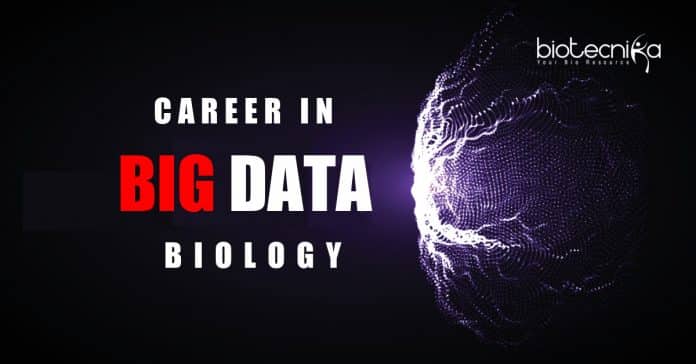Career in Big Data Biology
As Biotech, Pharma & healthcare have entered the digital era the scope of data science needs is massive. Big Data means enormous data that are computationally analyzed to identify patterns, associations, and trends. Studies say 90% of the world’s data has been generated in the last few years, and the data is increasing exponentially. Most of the organizations want to produce, preserve, and utilize the data effectively. With the huge data being generated, the demand for big data professionals is also expanding day by day to interpret and examine the data to make improved business decisions.
With the incredible growth, big data has turned out to be a remarkable career choice for many today. Industries from various domains offer different positions for big data professionals. This includes biology and healthcare too.
Cutting-edge technologies that emerged during the last few years have collected and generated an enormous amount of data. Scientists gathered countless terabytes of high-resolution videos of microscopic cells as they grow, reengineered bacterial genomes, sequenced millions of genomes of humans and animals. Answers to fundamental questions of life may lie within those unprecedented amounts of data, like answers to what gives stem cells the
power of pluripotency, what causes diseases like cancer, and how many different types of cells make up the human brain.Manual analysis of such a huge amount of data would be nearly impossible. That’s where big data professionals play a major role with the help of computer science and artificial intelligence. A lot of opportunities are available in the Big Data domain, and everyone is as much as crazy to establish their career in Big Data. Professionals are having a surge to understand Big Data and to develop their careers.
Why is the Big Data Profession in Huge Demand?
1. Increased Job Opportunities
With developing technologies and countless data being generated, the companies and organizations across the world have a huge demand for big data professionals. As Jeanne Harris, a senior executive at Accenture Institute, said, “Data is useless without the skill to analyze it.” There is an explosion of big data jobs across the world in different fields. However, in the past few years, demand for big data professionals in the field of biology and medicine has increased enormously, be it for analyzing molecular pathways, genomic sequences, or different populations of people in research organizations and healthcare companies.
2. Wide Range of Options in Job Titles and Responsibilities
Big Data professionals have a wide range of job titles available, depending on the skills they have achieved so far. Based on their career interests, the options for the big data job seekers are many where they are free to align their career paths. Some of the job titles big data professionals can have are as follows:
- Data Engineer
- Big Data Analyst
- Visualization Specialist
- Machine Learning Expert
- Business Analyst
- Solution Architect
- Analytics Consultant
- Big Data Solution Architect
3. Lack of Big Data Talent
There is a continuous demand for big data professionals, but the supply of talent is limited. This shortfall of big data talent is universally making big data analytics as a ‘Hot’ job. Not only for engineers, but the requirement is also there for managers and business analysts who would understand or interpret output analysis and recommend suitable decisions. There aren’t enough big data professionals in the world right now, which increases the demand for skilled individuals.
4. Attractive Salary Package
Ever since the need for big data expertise has become huge, the salary offered has also become high. Organizations are highly benefiting from big data analysis to stay ahead of the competitive market. And for the same reason, they are offering attractive salary packages to the employees. For professionals looking for strong growth, learning curvature, and rewarding salary, big data remains the most desirable job.
Career Opportunities in Big Data Science in Biology
An enormous amount of data has been generated with the recent advances in various different areas of life sciences such as biopharma, computational neuroscience, high-throughput genomics, medical and cellular imaging. Handling, analyzing, and interpreting such large data sets becomes a huge challenge to the researchers. Healthcare services and personalized medicines have been impacted by the advent of big data. Using advanced technologies, scientists can now carry out interpretation of data at an unprecedented level and have witnessed novel outcomes.
The healthcare and life sciences sector has been transformed by data interpreting technologies such as Artificial Intelligence, Sophisticated Measurement Technologies, Cloud Computing, and efficient Computing Platforms and Tools.
Career opportunities in Big Data in biology are several, and based on their interest and skills, they can choose the right one for them. Some of the renowned Big Data career pathways are as follows:
Data Scientist
Companies and organizations had been accumulating data for several ages. Hence the current demand in big data is leaning much more towards analytics. Conferring to LinkedIn, there is an enormous requirement for individuals who can mine and decipher data. They are none other than data scientists. There is a huge demand for data scientists, especially in the biopharma industry.
Data scientists are a mix up of mathematicians, trend-spotters, and computer scientists. The data scientist’s starring role is to interpret huge amounts of data and perform additional assessments to discover trends in the data and earn a greater perception into whatever it implies. They lead industries by exploring complicated datasets to manipulate out perceptions that companies can use into actions. To begin a profession in biological data science, solid skills in analytics, machine learning, statistics, Hadoop, etc. are required apart from sound knowledge in biology.
The nine areas in biotechnology where data scientists are employed are listed below;
- Genomics
- Drug safety
- Drug discovery
- Crowd-sourced R&D
- Drug recycling
- Making drug trials more effective
- Outcomes data
- Connection the ‘bio dots’—predictive models
- Business development/marketing
In Conjunction with heaps of global job opportunities in Big Data, the data scientist position has become the hottest job of the era. In the present world comprising data, companies are utilizing the perceptions that data scientists deliver to remain one step at the forefront of their race while maintaining operating costs at a low level. In the US, data science is one of the top-ranked 50 professions. With the demand for data scientists increasing every year, their salaries will also keep increasing. The average salary per annum of data scientists in India is Rs. 698,412, while an entry-level data scientist can earn Rs. 500,000 per annum.
Clinical Data Analyst
A clinical data analyst manages and develops databases for healthcare organizations, typically in a clinical setting or in relation to clinical trials. The key responsibility of a clinical data analyst is to ensure that data is reliable and accurate. But that’s not it. Many organizations recruit clinical data scientists to ensure that the information collected through clinical trials is relevant, error-free, and sound.
Their responsibilities include source data management, development of clinical data testing systems, including documentation, design, reporting, and implementation, software development, and reporting relevant results to stakeholders.
Data Architect
Data architects operate diligently with users, system designers, and developers to create designs for the data management structures efficiently, which ultimately are used to consolidate, incorporate, maintain, and protect data sources. The average salary of a Data Architect in India is around Rs. 1,722,000 per annum, which can go as low as Rs. 1,015,000 and as high as Rs. 3,131,000 per annum.
Bioanalyst/ Bio-informatician
Bioanalysts, also known as bio-informaticians, one of the careers in big data biology, is responsible for creating, breaking down, and investigating biological compounds. They are typically employed in research roles for drug developers or universities. They use different biological analysis tools and software to study biological compounds. They must have sound knowledge in molecular biology, genetics, probability, and statistics, besides good project management skills in regards to supervising staff, collecting data, and reporting results. Bioanalysts are employed in agricultural firms, biotechnology firms, research centers, healthcare institutions, pharma companies, etc. Their starting salary range from 2.5-3.5 Lakhs per annum and 1-2 years experienced professionals can get 4-6 Lakhs per annum. Salary will increase with knowledge and experience.
Computational Biology Scientist
Scientific software companies, pharmaceutical companies, and biotechnology companies all employ computational biologists in research and development. The job responsibilities of a computational biology scientist include developing analytical software for use by biologists, modeling drug interactions, and analyzing large data sets for biotech companies that provide genetic analysis services are all potential applications of computational biology. A Ph.D. degree or Master’s in computational biology is preferred for these jobs. The salary of a computational biologist can range from Rs 15,00,000 to Rs 25,00,000 per annum.
Data Engineer/ Data Mining Engineer
This is the Big Data non-analytic career path. They make sure there is a continuous stream of data between servers and applications. They are also responsible for data architecture. The job responsibilities of a data engineer include translate and use data programming language, prepare and organize data for modeling, actively look for ways to make data more efficient, unimpeachable, and of high quality, and use statistical methods and machine learning to solve problems. Data mining engineer analyses the data for their own business and third parties as well. Besides examining data, they will also create automated algorithms to analyze the data further. The average salary of a data engineer in India is Rs.8,56,643.
Database Developer
The role of a Database developer is to analyze current database processes with the aim of streamlining, reorganizing, or eradicating ineffective coding. They are tasked with supervising database performance, creating new databases, and troubleshooting if any problem arises. They need to work along with members of the development team. Ample experience in unit testing, database development, and data analysis is required for a database developer. The average salary of a database developer in India is Rs 5,79,899.
Programmer
The responsibility of the programmer is to create the code to carry out repeated and provisional actions on the accessible data sets. In order to write good code, one should possess knowledge of various programming languages like Shell scripting, Java, Python, R, etc. They should also have analytical, mathematical, logical, and statistical skills. The average salary for a Computer Programmer in India is Rs 490321.
Eligibility for a Career in Big Data Biology
For a successful career in Big Data Biology, one needs to work on quantitative and computational biology skills. Knowledge of bioinformatics, biological science, and computer science is a must.
Though there are no fixed educational requirements for a career in big data, most of the professionals working in the industry have a bachelor’s or master’s degree in mathematics, science, engineering, finance, statistics, or economics. Even if you are from any other background, you could take certification courses and gain the required skills to become a big data professional. If you are looking forward to big data professions in biology, you might need a basic understanding of proteomics, genomics, and other biological concepts.
Big Data Job:
The organizations all over the world have begun to consider the field of Big data lately. The job market for big data experts in biology is enormous and the career opportunities are escalating fast. Interestingly, India presently has the greatest attention worldwide in analytics.
The big data job situation can be well understood by the following points:
- It was reported that “Demand for Data developers, Data Scientists, and Data Engineers, etc. will attain ~ 700000 vacancies by 2020.
- Economic Times report has indicated that the big data endowment requirement in India has risen 50% last year. Big data specialists obtain 40% extra compensation than IT skills.
- There is a substantial gap in the need and availability of big data professionals with skills. There is a dearth of big data skills as they are tough to discover and get. The companies are proposing an immense salary for big data talent jobs.
- About 39% of the data scientists and the advanced analyst positions required a Master’s or Ph.D. degree.
Things to consider prior to moving towards careers in Big Data Biology:
1. Learn the Fundamentals Perfectly
It is important to know the fundamentals of the tools that you need to work on. If the techniques are trained well, there will be a greater possibility of getting the job of interest. Holding the field knowledge can assist the analysts and professionals significantly. The expertise of implementation and preservation of the tools is also beneficial. Big data analytics is used to solve real-life issues. The outputs received from the tools can be complex. If you know the trade well, you can pick the right tool for the proper purpose.
2. Expertise in the Big Data Technologies
Tools like SPSS, SAS, R, SQL, Apache Hadoop, Pig, Hive, Storm, etc. should be expertise well. Try to pick and choose the tools first and become experts on these. Have updates on the latest technologies as it will help to make the right decisions. Get accustomed to the fundamental tools and master in that. Most of the software is open source and easily accessible.
3. Get Experience
Once you are aware of the techniques, look for the opportunities. It looks difficult to start to work initially in big data technology. But apply your fundamental skills to understand the data flow. Find the source of data and the repositories for data storage. Knowledge of the process or function of data generation should be known. After data analysis, reports can be generated. Based on that, the right decisions can be taken accordingly. Get more and more experience with big data technologies.
In this field, more opportunities are available, provided if you have good skills and credentials, you can grab it now and in the future, also.
Author: Dr. Elamathi & Namitha






































